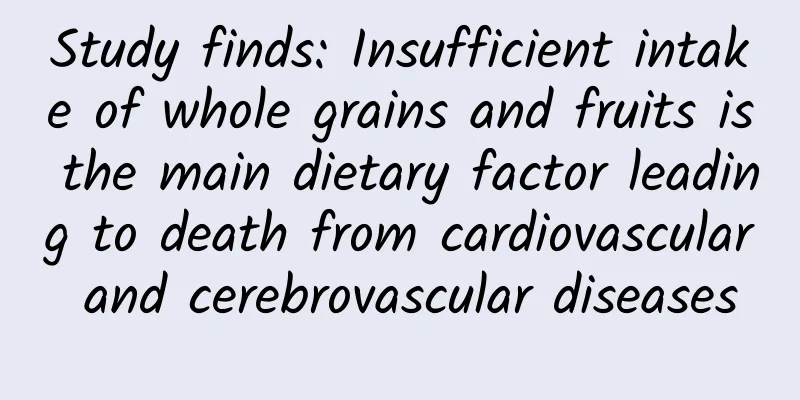Study finds: Insufficient intake of whole grains and fruits is the main dietary factor leading to death from cardiovascular and cerebrovascular diseases

|
Lancet Journals: Whole grains and fruits Inadequate intake Is the cause of Chinese residents The main dietary factors for death from cardiovascular and cerebrovascular diseases Recently, The Lancet Regional Health-Western Pacific published a research paper titled "The burden of cardiovascular disease attributable to dietary risk factors in the provinces of China, 2002-2018: a nationwide population-based study", focusing on the disease burden of cardiovascular and cerebrovascular diseases attributable to unreasonable diet among residents aged 20 and above in China and its provinces and cities from 2002 to 2018. The co-corresponding authors of the paper are He Yuna from the Institute of Nutrition and Health, Chinese Center for Disease Control and Prevention, and Zhou Maigeng from the Center for Chronic Non-communicable Disease Prevention and Control, Chinese Center for Disease Control and Prevention. Key findings 1. The intake of whole grains, vegetables, fruits, red meat, soy and nuts by Chinese residents is on the rise, while the intake of sugary drinks has not changed much. The study analyzed the intake of whole grains, vegetables, fruits, red meat, soy, nuts and sugary drinks and the attributable cardiovascular and cerebrovascular disease burden among Chinese residents aged 20 and above from 2002 to 2018. The results showed that the dietary structure of Chinese residents is still not reasonable. The intake of red meat and sugary drinks exceeds the recommended intake of Chinese dietary guidelines, while the intake of other foods is lower than the recommended intake. The average daily intake of whole grains (21.2g/d) and fruits (114.1g/d) is only half of the recommended intake (50-100g/d for whole grains and 200-350g/d for fruits). 2. The number of cardiovascular and cerebrovascular deaths attributed to unreasonable diet is on the rise, and insufficient intake of whole grains, fruits and vegetables is the main factor. The study used the GBD 2017 method to analyze the number of deaths, mortality rates, and disability-adjusted life years (DALYs) from cardiovascular and cerebrovascular diseases attributed to unreasonable diet in 31 provincial administrative regions in China from 2002 to 2018. The results showed that in 2018, about 1.54 million cardiovascular and cerebrovascular deaths were attributed to unreasonable diet, including about 827,000 coronary heart disease (mortality rate 84.5/100,000), about 365,000 ischemic stroke (mortality rate 37.3/100,000), and about 352,000 cerebral hemorrhage (mortality rate 35.9/100,000). The number of cardiovascular and cerebrovascular deaths and mortality rates caused by unreasonable diet in men were higher than those in women. Insufficient intake of whole grains and fruits is the main dietary risk factor for death from coronary heart disease, ischemic stroke and cerebral hemorrhage among Chinese residents, which caused more than 600,000 cardiovascular and cerebrovascular deaths nationwide in 2018. Insufficient intake of nuts and soy and excessive intake of sugary drinks are only associated with death from ischemic stroke. 3. The standardized mortality rate attributable to unreasonable diet was highest in Shandong for coronary heart disease, highest in Heilongjiang for ischemic stroke, and highest in Tibet for cerebral hemorrhage. Among all diet-related cardiovascular and cerebrovascular disease deaths in different provinces in 2018, the highest age-standardized mortality rate for coronary heart disease was in Shandong (141.1/100,000), ischemic stroke was in Heilongjiang (54.4/100,000), and cerebral hemorrhage was in Tibet (84.8/100,000). In 2018, the disability-adjusted life years (DALYs) attributed to unreasonable diet for stroke were 16 million (1137.1/100,000), and for coronary heart disease were 13.9 million (990.2/100,000). Among them, Henan Province had the highest DALYs attributed to unreasonable diet (1.4 million for stroke and 1.3 million for coronary heart disease). Conclusion and Recommendations Cardiovascular and cerebrovascular diseases are the leading cause of death in my country, accounting for 43.0% of the total number of deaths and 24.1% of the total number of disability-adjusted life years for both men and women in 2019. The burden of premature death related to cardiovascular diseases has remained high in recent years. Unreasonable diet is an important risk factor for many cardiovascular and cerebrovascular diseases. In the past few decades, many studies have been devoted to clarifying the relationship between diet and cardiovascular and cerebrovascular diseases, which also shows that a healthy and reasonable diet is an effective and feasible means to reduce the burden of cardiovascular and cerebrovascular diseases. Studies have shown that the overall burden of cardiovascular disease caused by dietary risk factors in various provinces in my country continued to rise from 2002 to 2018, and the changing trends varied greatly among provinces. Regionally targeted intervention strategies should be adopted to improve the quality of residents' diets and reduce the dietary-related burden of cardiovascular and cerebrovascular diseases. |
Recommend
Signs of female hormone explosion
In fact, whether it is men or women, hormones exi...
Will girls get spots if they stay up late?
Why do women often get spots on their faces? Will...
White stuff on nipples
A woman's breast is a very important part, it...
Cancer is not scary. If you do these three things, you can "live with cancer". Please save this article.
With the advancement of modern medical technology...
Tips for relieving headaches during pregnancy
It is a very serious problem for pregnant women t...
Causes of right uterine pain
People say that money can buy medicine but it can...
How to treat menstrual diarrhea?
The most troublesome thing for female friends is ...
Do you rebound after dieting? Scientists can help you prevent it!
When it comes to dieting to lose weight, are you ...
Breast nodules birads3
Many people may not know what disease birads3 bre...
What should women with kidney deficiency do?
Every morning after waking up, I always find that...
Causes of pimples on the vulva
It is a common phenomenon that some strange small...
Abdominal pain after menstruation
Most women nowadays show a kind of sick beauty ph...
Female anal abscess picture
Perianal abscess is a common suppurative infectio...
My blood sugar is a little high, can I drink porridge?
A netizen asked: My grandmother was diagnosed wit...
What is the best way to relax after doing a plank? How long should a girl do a plank?
When we do plank support, we will feel very tired,...









